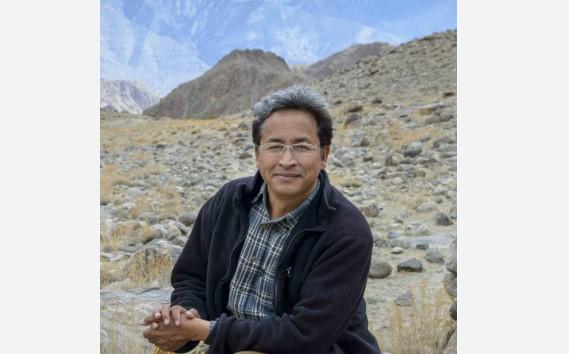The Supreme Court on Monday sought responses from the Union government and the Ladakh administration on a petition filed by Gitanjali Angmo, wife of Ladakhi education reformer and climate activist Sonam Wangchuk, challenging his detention under the National Security Act (NSA).
The Centre and Union territory, however, told the court that the plea was aimed at “creating hype” around Wangchuk’s detention.
A bench of justices Aravind Kumar and NV Anjaria issued notices to the Centre, the Ladakh administration, and the Jodhpur Central Jail, where Wangchuk is currently lodged, and listed the case for hearing on October 14.
While senior advocate Kapil Sibal, appearing for Angmo, pressed for an immediate supply of the grounds of detention to Wangchuk’s wife, the bench refrained from passing any order at this stage, saying it would first consider the replies of the authorities.
Sibal told the court that despite repeated requests, Angmo had not been provided with the grounds of detention, which prevented her from filing a representation against the order. “According to the judgment of this court, family members are also to be given the grounds of detention. We have not been supplied with the grounds, and the wife is not being allowed to meet him,” he said.
Appearing for the Centre, solicitor general Tushar Mehta maintained that all legal procedures had been followed and that there was “no violation” of Wangchuk’s rights. “We have supplied everything under the law. Nobody is being stopped if the law allows. Let us not create a hype,” said Mehta, adding that the authorities would “examine the feasibility” of giving the wife a copy of the detention grounds. He emphasised that the NSA required the grounds to be served on the detenue, not on family members.
The bench questioned both sides on the issue, noting that Section 8 of the NSA only mandated that the grounds be communicated to the person detained. “They say it has already been done,” observed the bench, while refraining from issuing directions for now.
When Sibal argued that the petition had been moved directly under Article 32 since the detention order was issued by the Centre, the bench asked why Angmo had not approached the high court first. “We will hear you all next week and decide,” said the court, declining to pass any interim order.
The court, however, recorded the solicitor general’s submission that the authorities would ensure Wangchuk’s medical needs were met as per prison rules. The order stated, “It is observed that the detenue receives medical care as required and the same shall be facilitated as per the extant prison rules.”
Wangchuk, a Ramon Magsaysay awardee known for his work in sustainable education and environmental innovation, was detained on September 26 under the NSA following protests in Leh that turned violent two days earlier, leaving four civilians dead and several others injured. Authorities alleged that his speeches, in which he referred to “self-immolation” as a form of protest, posed a threat to public order.
Angmo’s petition before the Supreme Court calls the detention “illegal” and accuses officials of unleashing a “systematic and false campaign” to malign her husband’s peaceful, Gandhian movement for protecting Ladakh’s fragile ecology. It asserts that portraying environmental activism as “anti-national” is a dangerous precedent and that Wangchuk’s work has consistently contributed to national unity and support for the Indian Army through innovations such as high-altitude shelters.
Wangchuk, who is on a hunger strike, has said he is prepared to remain in jail until an independent judicial inquiry is ordered into the killings during the Leh protest. In a letter from Jodhpur jail, released by advocate Mustafa Haji on October 5, he urged the people of Ladakh to continue their movement peacefully “in the true Gandhian way of non-violence.”
Under NSA, a person can be detained without charge for up to 12 months. A detention order can be issued by the central or state government, or by authorised officials like a district magistrate or police commissioner if it is considered necessary to prevent a person from acting in a manner prejudicial to the security of the state, public order, or essential supplies and services. A person can initially be detained for up to three months, which can be extended subject to a review by an advisory board, which consists of high court judges and others. Within three weeks of detention, the case ought to be referred to an advisory board. Within 5 to 15 days of detention, the grounds for detention must be communicated to the detainee. The detainee has the right to submit a representation against the detention order to the government.


